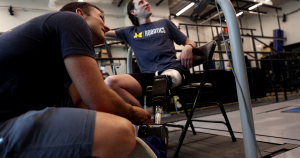Presented By: Michigan Robotics
The Development and Evaluation of Biomimetic Control for Robotic Lower-Limb Prostheses: Advancing Toward Real-World Clinical Use
PhD Defense, Kevin Best

Co-chairs: Bobby Gregg and Elliott Rouse
Abstract:
Powered robotic prostheses promise to improve mobility and quality of life for individuals with lower-limb amputation by more effectively replacing the functions of the missing limb. However, their adoption into mainstream clinical practice remains limited due in large part to a lack of clinically viable control methods to effectively govern their behavior in diverse real-world conditions.
In this dissertation defense, I will share our work towards addressing this need through the development of a novel data-driven controller that can adapt to variable real-world conditions while maintaining performance and clinical viability. We investigate the clinical outcomes of our proposed control framework, showing that it allows both prototype and commercialized prostheses to produce meaningful benefits over traditional passive prostheses. Finally, we show how the impedance properties of controllers like ours affect the user's ability to walk during destabilizing gait perturbations, which are inevitable in community ambulation.
In total, the work presented in this defense aims to help advance robotic prostheses out of research labs and into mainstream clinical practice by providing a clinically viable control framework that produces concrete clinical benefits while also accommodating the diversity of real-world ambulation.
Abstract:
Powered robotic prostheses promise to improve mobility and quality of life for individuals with lower-limb amputation by more effectively replacing the functions of the missing limb. However, their adoption into mainstream clinical practice remains limited due in large part to a lack of clinically viable control methods to effectively govern their behavior in diverse real-world conditions.
In this dissertation defense, I will share our work towards addressing this need through the development of a novel data-driven controller that can adapt to variable real-world conditions while maintaining performance and clinical viability. We investigate the clinical outcomes of our proposed control framework, showing that it allows both prototype and commercialized prostheses to produce meaningful benefits over traditional passive prostheses. Finally, we show how the impedance properties of controllers like ours affect the user's ability to walk during destabilizing gait perturbations, which are inevitable in community ambulation.
In total, the work presented in this defense aims to help advance robotic prostheses out of research labs and into mainstream clinical practice by providing a clinically viable control framework that produces concrete clinical benefits while also accommodating the diversity of real-world ambulation.